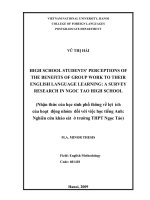benefits of volunteering lợi ích của hoạt động tình nguyên
Bạn đang xem bản rút gọn của tài liệu. Xem và tải ngay bản đầy đủ của tài liệu tại đây (680.52 KB, 2 trang )
National Survey of
Giving, Volunteering and Participating
NSGVP The Benefits of
2 0 0 0 Volunteering
Nonprofit and voluntary organizations, individuals, and society
as a whole benefit from the activities of volunteers. Volunteers
themselves also benefit from their volunteer activities, according
to the 2000 National Survey of Giving, Volunteering and
1
Participating (NSGVP).
Percentage Who Reported Gaining Skills
from Volunteer Activities
100%
% of Volunteers
79%
68%
63%
57%
50%
45%
Top benefits of volunteering
More than three quarters (79%) of volunteers said that their
volunteer activities helped them with their interpersonal skills,
such as understanding people better, motivating others, and
dealing with difficult situations.
33%
0%
Interpersonal Communication
Skills
Skills
Just over two thirds (68%) of volunteers said that volunteering
helped them to develop better communication skills Sixty
three percent reported increased knowledge about issues
related to their volunteering.
20 - 71 Hours
Volunteering is often seen as an opportunity to acquire jobrelated skills and improve job opportunities. Almost
one quarter (23%) of volunteers said that they volunteered
for this reason.
Fundraising
Skills
Technical or
Office Skills
72 - 187 Hours
1 - 19 Hours
188+ Hours
88%
The effects of volunteering more
Job skills as a motivation to volunteer
Managerial
Skills
Percentage Who Reported Gaining Skills by
Average Number of Hours Volunteered
100%
The percentage of volunteers who reported gaining specific
skills as a result of volunteering increased steadily with the
number of hours they contributed. For example, over three
quarters (78%) of volunteers who contributed 188 or more
hours during 2000 reported gaining communication skills,
compared to just over half (52%) of those who contributed
19 hours or less. Similar, but less pronounced, patterns are
seen with other skills.
Increased
Knowledge
78%
81%
74%
66%
78%
74%
66%
62%
52%
64%
52%
50%
0%
Interpersonal Skills
Communication Skills
Increased Knowledge
Volunteered to Improve Job Opportunities,
by Age
70%
% of Volunteers
55%
35%
27%
18%
13%
8%*
The desire to improve job opportunities is a much more
common motivation for volunteering among younger and
unemployed volunteers than it is among other volunteers.
Over half (55%) of volunteers aged 15 to 24 said that they
volunteered to improve their job opportunities. This dropped
to 27% among those aged 25 to 34. Forty-two percent* of
unemployed volunteers gave this reason for volunteering,
compared to only 22% of volunteers who were employed or
not in the labour force.
0%
15 – 24
25 – 34
35 – 44
45 – 54
55 – 64
Volunteered to Improve Job Opportunities,
by Employment Status
60%
42%*
30%
1
NSGVP estimates are based on reports of charitable giving and volunteering
over a one-year period by Canadians aged 15 and older.
* Sample size limitations affect the reliability of this estimate.
22%
0%
Employed
www.givingandvolunteering.ca
22%
Unemployed
Not in Labour Fource
National Survey of
Giving, Volunteering and Participating
NSGVP
2000
The Benefits of Volunteering
Page 2
Volunteering and employment-rrelated
benefits
Generally, the same groups that are most likely to
volunteer to improve their job prospects are also more
likely to say that volunteering increased their skills and
improved their job prospects.
For example, volunteers aged 15 to 24 were more
likely than older volunteers to report gaining increased
communication skills (82%) and interpersonal skills
(77%) from their volunteer activities. However, those
aged 55 to 64 were more likely than other volunteers to
report gaining knowledge from their volunteer activities.
Unemployed volunteers were more likely than other
volunteers to report gaining communication skills.
Three quarters (75%) of unemployed volunteers
reported gaining communication skills, compared to
68% of employed volunteers and 66% of volunteers
who were not in the labour force. Similar, but less
pronounced, patterns were seen with other skills.
Percentage who Report Gaining Skills, by Age
35 - 44
45 - 54
25 - 34
100%
55 - 64
15 -24
82% 81% 80%
78%
65 +
77%
74% 75%
71%
67% 65%
62% 64% 64% 62%
61% 59%
69%
60%
50%
0%
Interpersonal Skills
Communication Skills
Increased Knowledge
Percentage Who Report Gaining Skills,
by Employment Status
100%
Employed
Unemployed
82%
79%
77%
Not in the Labour
Force
75%
68%
68%
66%
63%
63%
50%
Just under half (49%) of employed volunteers aged 15
to 24 said their volunteer activities gave them new
skills that they could apply directly to their job.
Additionally, almost one quarter (24%) of volunteers
aged 15 to 24 said that their volunteer activities had
helped them in the past to obtain employment.
Perhaps the most compelling finding regarding
the effectiveness of volunteer activity in helping people
to obtain employment is that 28% of unemployed
volunteers (and 16% of employed volunteers) said
that their volunteering had helped them obtain a job in
the past and 62% of unemployed volunteers believed
that it would help them to find a job in the future.
0%
Interpersonal Skills
Communication Skills
Increased Knowledge
Job-R
Related Benefits, by Age
100%
Volunteer activities helped
to obtain employment
(All Volunteers)
Learned new skills that can
be applied to job
(Employed Volunteers)
50%
49%
37%
35%
36%
29%*
24%
21%
12%
12%*
8%*
0%
15-24
For more information on the 1997 and 2000
National Survey for Giving, Volunteering
and Participating, including full text of the
highlight report, Caring Canadians,
Involved Canadians, please visit
www.givingandvolunteering.ca.
25-34
We would like to acknowledge the support of
our funder, Human Resources Development
Canada (HRDC), for the production of this
fact sheet.
©
2004, Canadian Centre for Philanthropy
www.givingandvolunteering.ca
We welcome your feedback about this research product and how you made use
of it. Please e-mail us at
35-44
45-54
55-64
Canadian Centre for Philanthropy
Research Program
425 University Ave., Suite 700
Toronto, ON M5G 1T6
tel. 416.597.2293
fax. 416.597.2294









